
by Jennifer Burden | May 4, 2015 | 2015, Health, Motherhood, Save The Children, World Interviews, World Moms Blog, World Voice
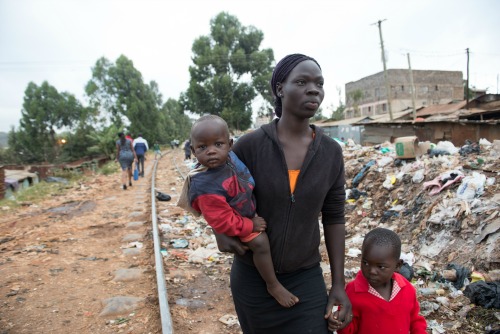
Family living in Kibera, the largest slum in Nairobi, Kenya.
Last week, World Moms Blog conducted an exclusive interview with Save the Children’s President and CEO, Carolyn Miles and Vice President of Global Health, Robert Clay at the United Nations headquarters in New York City. Our conversation was around the State of the World’s Mothers Report for 2015, released today! Carolyn had recently returned from Haiti, and was enthusiastic to speak about this year’s findings…
Jennifer Burden: The State of the World’s Mothers Report now covers 179 countries, how many years has it existed?
Carolyn Miles: This is the 16th report, and I have been with Save the Children for 17 years. It came about as a connection between the well-being of mothers and children around the world. The report measures the well-being based on 5 indicators: economic, education, maternal health, child survival and the representation of women in government.
JB: The theme of the report in 2015 seems to focus on urban areas. Save the Children is pulling apart statistical averages in cities. Why?
CM: It is driven by getting to the hardest to reach children. Seventeen thousand children die per day. That has halved from 33,000 since 1990. We are answering the question of, “Where are the hardest to reach children?” And the cities are where the world’s population is going. In 2007 there were 51% of people on the planet living in cities. Today that number is 54%, and the city population is rapidly increasing. Cities are where the children, mothers and parents are living.
Families move to the cities looking for a better life, but in the poorest areas, the urban slums, children there are 2 times as likely to die than the richest kids in the same city.
If you look at the averages, the averages in cities are generally better than in rural areas. But, if you break it down, the poorest kids in cities are 2 times as likely to die as the richest kids in cities. And, those kids are also more likely to die than children in the rural areas.
JB: The urban data — when we think of child survival rates and socioeconomic disparities, most may think of cities such as Kampala, Delhi or Rio, but the report hits home, here, in the U.S. Can you tell us about Washington, D.C.?
CM: Yes, we looked at 25 capital cities in high income countries and the infant mortalities, including the deaths of infants under the age of one. Washington, D.C. was at the bottom. When we compared the wealthiest district and the one with the most poverty, children in the district with the most poverty were 10 times more likely to die than children from the wealthiest district.
Inequality is an important issue in the United States.
Urbanization in 2030 is expected to account for 65% of the population and to further increase in 2050.
Also, a key point is that the data is weak. We are looking at the DHS infant mortality rates, and the world needs to do a better job in accounting for this data.
JB: What was the biggest surprise this year?
CM: It was no surprise that the Scandanavians are always at the top. If we really want mothers and children to have a better life, we should support them.
To give a really specific answer, inequality is killing kids.
I just returned from Haiti 2 days ago. Haiti is in the bottom 10 and hasn’t been there in a long time. Number 1, the country has a very low education rate. Fifty percent of children do not get through primary school. Number 2, the decreased strength in the government slowed progress. I met with a bunch of moms and babies who are getting very basic healthcare, but more has to be done.
(Haiti is tied at number 169 with Sierra Leone in the 2015 Mothers Index Rankings and was just shy of the bottom 10 at number 168 last year in the 2014 Mothers Index Rankings.)
JB: What was the biggest success story?
CM: Panama made a lot of progress this year and has moved up in the rankings. This was driven by education and improvements in the representation of women in their government.
(Panama moved up to number 78 in the 2015 Mothers Index Rankings. That is a jump of 31 spots, from a ranking of number 109 in the 2014 Mothers Index Rankings.)
JB: As I read in the report, Carolyn, you have an interesting “World Mom Moment” that led you to leave the corporate world and work for Save the Children. (According to the State of the World’s Mothers Report 2015, Carolyn was in Manila holding her 6 month old son 20 years ago, and she felt that it wasn’t right that children she saw in poverty would have a very different chance at life than her son. It was that experience that led her to leave the corporate world and join Save the Children.) So, on World Moms Blog, we always ask, “What is your wish for world mothers?”
CM: Yes, I did, in Manila while holding my son when he was a baby! My wish is mostly that every mother has the basics: basic healthcare, that their children can go to school, and in conflict countries that moms and children are protected.
JB: What is the one action you would like us to take and encourage our World Moms Blog community to take to help mothers and children worldwide?
CM: Just one? (laughter) Please go to the Save the Children Web Site!
1) Donate to the programs — there are many choices!
2) Save the Children has a policy ask. To press the US government, a world leader in child and maternal health, to pass the Coons, Graham and Cardin Bill to support global maternal and child health programs. We must keep pushing.
3) In the new UN Goals there is a big focus in inequality. We think that is REALLY important that we ask that these goals are supported in order to reach the most deprived kid. These are the goals that every country will sign off on.
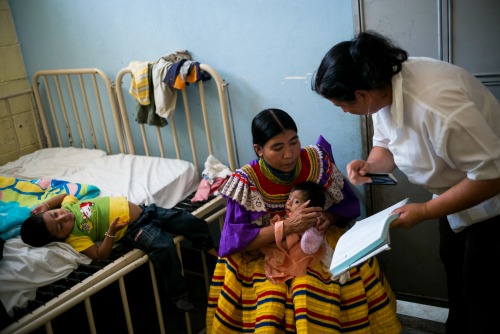
Photo credit to Save the Children.
JB: Next, we have fielded some questions from our World Moms Blog contributors. First, Cindy Levin, the Anti-Poverty Mom in Missouri, USA asks, “What is the biggest area of opportunity to save kids lives this year…vaccines? nutrition?”
CM: It is hard to pick one. This year it’s important to get the new goals right, and we’re pushing for children to be central to them. In 1980 that is how things were done — one goal would be focused on. But when you only have a vertical lens, you’re not taking advantage of the integration of services.
Now, the focus is on smart integration to meet the demands of the children.
For example, in Nepal, the focus is on nutrition, as well as, water and sanitation. If a child is getting proper nutrition, but is drinking dirty water, then they are going to get sick and the nutrition alone won’t help. They have to work together.
JB: Next, our contributor, Kristyn Zalota of Cleanbirth.org in Connecticut, USA asks, “The largest obstacle moms in Southern Laos have to reaching a clinic is distance and lack of transportation. How common an obstacle is this for women worldwide?”
CM: Very common. Transport is a big barrier for women worldwide. Some of the solutions we are using are to construct mother homes next to clinics to decrease the distance, and her family can join her, like a birthing hut system. Another way to get the pregnant mother to the clinic is by ambulance. We line up the ambulances ahead of time in anticipation of the birth. For example, in Uganda, bicycle ambulances are used, and they have a sled in the back for the mother.
JB: Lastly, Maryanne W. Waweru of Mummy Tales in Kenya asks, “In societies that are very patriarchal and in communities that still uphold retrogressive cultures (this is so in many African cultures), where a woman’s reproductive health decisions are dictated by men (fathers, husbands, brothers, etc.), how is Save the Children working with men in this regard? Any examples?”
CM: This is a really important question. I’ll give you an example in Uganda, where there are lots of family planning clinics available that are supported by the government. But yet, we found that not all mothers were using them because they had not gotten permission from their husbands. So, sometimes access is not the problem.
Save the Children is encouraging and having “family discussions”, a way of bringing men into the discussions. We give them stats, economics, etc. that leads to the the better health of children and family spacing.
Robert Clay: Save the Children also works with adolescents on this topic. We are bringing boys and girls into the discussions before they are having children, and we talk to them about their roles and responsibilities.
Another example of how I have seen this work is through my prior work with USAID. We had soccer games for the boys with an additional afternoon discussion around sexuality. At the beginning, most of the boys only wanted to play soccer and made it clear that was what they preferred to do. Many were hearing for the first time factual information about sex, their roles as men and how to establish responsibility early on. Then, as they attended more discussions, the boys spoke of their preference to spend more time in the discussions than playing soccer!
Additionally, there is a women in government piece to this question. Societies with more women in decision making roles pass policies that are friendly to women and children. And when it comes to economics, when women have money they invest in their children.
Thank you to both Caroline Miles and Robert Clay for this exclusive interview. After the interview, there was a press conference at UN Headquarters including information on the 2015 State of the World Mothers Report. Look out for a follow up post on WorldMomsBlog.com about the press conference.
This is an original post to World Moms Blog by founder, Jennifer Burden of New Jersey, USA.
Updated May 5th, 2015. Carolyn had her “World Mom Moment” in Manila, not Hong Kong, as previously stated.
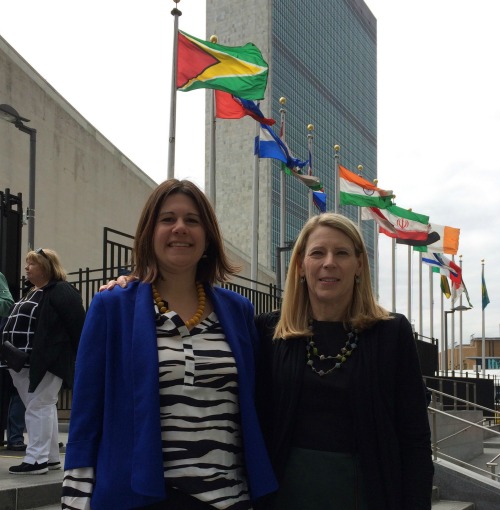
Jennifer Burden, Founder of World Moms Blog with Carolyn Miles, President and CEO of Save the Children at the United Nations, April 30, 2015.
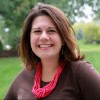
Jennifer Burden is the Founder and CEO of World Moms Network, an award winning website on global motherhood, culture, human rights and social good. World Moms Network writes from over 30 countries, has over 70 contributors and was listed by Forbes as one of the “Best 100 Websites for Women”, named a “must read” by The New York Times, and was recommended by The Times of India.
She was also invited to Uganda to view UNICEF’s family health programs with Shot@Life and was previously named a “Global Influencer Fellow” and “Social Media Fellow” by the UN Foundation. Jennifer was invited to the White House twice, including as a nominated "Changemaker" for the State of the World Women Summit. She also participated in the One Campaign’s first AYA Summit on the topic of women and girl empowerment and organized and spoke on an international panel at the World Bank in Washington, DC on the importance of a universal education for all girls. Her writing has been featured by Baby Center, Huffington Post, ONE.org, the UN Foundation’s Shot@Life, and The Gates Foundation’s “Impatient Optimists.” She is currently a candidate in Columbia University's School of International and Public Affairs in the Executive Masters of Public Affairs program, where she hopes to further her study of global policies affecting women and girls.
Jennifer can be found on Twitter @JenniferBurden.
More Posts - Website
Follow Me:


by Aisha Yesufu | Apr 29, 2015 | 2015, Africa, Nigeria, World Interviews, World Voice
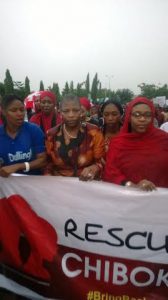 The first thing I noticed was her walk. In 2010, at Lagos International Airport, she walked purposefully, like one who has limited time to solve the world’s problems. It was nice seeing a woman walking with such force, even if it was just through the airport. I have been accused of walking like a man, and it was refreshing seeing another woman with that stride. Then, I realised it was the former Minister of Education–the one with the signature short haircut.
The first thing I noticed was her walk. In 2010, at Lagos International Airport, she walked purposefully, like one who has limited time to solve the world’s problems. It was nice seeing a woman walking with such force, even if it was just through the airport. I have been accused of walking like a man, and it was refreshing seeing another woman with that stride. Then, I realised it was the former Minister of Education–the one with the signature short haircut.
I didn’t know her name. I couldn’t be bothered about politics; my focus was surviving in a nation where one has to fight extra hard for the basics of life. As far as I was concerned, politicians were all the same: enemies of the common person struggling to make a living.
Even so, I heard of her once in a while. She was said to be tough on government corruption, especially those who used government funds as their own.
On April 30, 2014, I saw her again at the first march for #ChibokGirls. At the time, they has been missing for just 15 days. (They have now been missing for 379 days.) She was something else! She spoke with such passion. I knew I would never forget her name: Obiageli (Oby) Kathryn Ezekwesili. Everyone called her Auntie Oby.
The sky threatened rain, and as the clouds grew darker and more threatening, even I thought it would be the end of the march. Little did I know! Auntie Oby rallied the crowd:
“Are we salt? Would we melt if beaten by the rains? Do we know the condition our #ChibokGirls are in?”
And that was it. We went. The sky did open its floodgates, and we got drenched. I have never been so soaked, but we kept marching and chanting, “All we are saying is #bringbackourgirls.” Women forgot about their hair, and their appearance, and marched. I bet you that if Aunty Oby had asked us to, we would have marched to Sambisa Forest on that day and brought our #ChibokGirls back. At the end of that day, I told her I wanted to hug her. She opened her arms, and I held her tight. “Thank you for making me believe in Nigeria,” I said.
For me, Auntie Oby represents sacrifice and giving. She is the heart of the #BringBackOurGirls movement and considers the #ChibokGirls her daughters, refusing to let the world forget them.
She gives so much of herself that I am afraid that she will break. I sometimes wonder where she gets her strength from.
Auntie Oby has been a mother, mentor, teacher, and a beacon of hope to so many young people in Nigeria, a nation that desperately needs such role models. Her lessons keep us on task: to always deal with empirical evidence, to focus on the issue at hand and to not allow other issues drown the cries our #ChibokGirls. She insisted we develop core values to guide Bring Back Our Girls (BBOG): hope, unity, motivation, affability, nationalism, integrity, transparency, empathy, equity, discipline and sacrifice (HUMANITEEDS). These core values have been instrumental in making us a disciplined movement.
Aunty Oby, I am so grateful to God for bringing us together, despite the tragic reason for our meeting. You have shown me that the traits people have tried to shame me for are the very tools I can use to help others. I realized that the loud mouth that people tried to quiet could be used to unapologetically fight for others. I never had a big sister or aunty who encouraged me to do more. As the first born, I had to fill that role for my siblings. In the one year that I have known you, you’ve been that big sister. When I feel I can’t do something, you give entertain no such nonsense. “Aisha,” you say, in that voice that brokers no argument, “You have to do it.”
Everybody need such a voice in their lives to excel. Under your tutelage, I have done so many things I never dreamed I was capable of doing. Everyone has the capacity to contribute, but they need the right person who believes they can and gives no room for mediocrity.
Aunty Oby, it’s your birthday. May God give you all the best in this world and in the hereafter. Happy Birthday, to my amazing mentor. I cannot find the words to do you justice, but they are in my heart. I am sending a bear hug to you, and lifting you off the ground to dangle and twirl you all around so you can let go of the world’s problems for a few seconds. You made TIME’s 100 Most Influential People, but you are my person of the decade! I love you!

by juliegd | Apr 27, 2015 | Interviews, Portugal, World Interviews, World Moms Blog Writer Interview
 Where in the world do you live? And, are you from there?
Where in the world do you live? And, are you from there?
At the moment I live just outside a small rural village in the Alentejo region of Portugal. I say at the moment, because I have moved across the Atlantic from Brazil to Portugal and back again more times than I can count in the last six years. My background is even more complicated. I was born in a small village just outside Munich in Germany to an English mother and German father, meaning that I consider both England and Germany to be my home countries. As an added twist, my maternal grandmother was also born in Munich but emigrated to England just before WWII…I guess I have a multicultural, nomadic bent in my blood.
What language(s) do you speak?
English is the language I work in and speak to my baby boy, my husband is Brazilian so we also speak Portuguese at home – unfortunately, I now only speak German to relatives from my father’s side of the family. That doesn’t leave much space in my brain for the smattering of French and Spanish I learnt at school, which doesn’t stop me from trying whenever I get the chance!
When did you first become a mother (year/age)?
In July 2014 I gave birth to a beautiful baby boy in the city of Vila Velha, Brazil just a few months shy of my thirtieth birthday. We started trying for a baby about a year beforehand because we felt we would be happy to settle in our apartment by the beach for a while. Of course, life had other plans and we ended up moving to Portugal with a 4-month old baby in our hand luggage.
Are you a stay-at-home mom or do you work?
Both. I stay at home with my baby boy and work from home as a freelance translator. I feel very lucky to be able to do this.
Why do you blog/write?
Because I can! Teachers at school and university were always critical about my writing style, which meant I left higher education feeling that I was a complete failure at writing. That changed when I sat the UK translation diploma and chose Literature as one of my specialties. Passing this exam the first time gave me a super boost of confidence. Just perhaps those teachers at school had been wrong about me? I’m still finding out.
What makes you unique as a mother?
Everything and nothing. I’m a bit of an introvert and being a mother has made it much easier for me to connect to other parents – I feel that no matter our background, beliefs or culture we immediately have something in common. On the flip side, parenting can be quite isolating when you feel other people don’t share the same ideas on how to raise children. That’s why the internet can be such a great resource – when you feel like you’re on your own, you’ll always find a mother with a similar outlook blogging from somewhere in the world.
What do you view as the challenges of raising a child in today’s world?
Giving our kids the freedom to grow. Everywhere I look children seem to be limited in some way. Babies are taught to sit still in strollers. Primary school kids can no longer walk to school. School days are getting longer and more test-oriented. Afternoons are filled by a strict regime of activities. While all of these decisions are made in the best interest of the child, I feel it is limiting their ability to grow naturally both physically and mentally,.
How did you find World Moms Blog?
One of those lazy, rainy pre-baby days where you first click on one link, then on another, then another and suddenly find yourself at World Moms Blog!
These interview questions were answered by Julie from Portugal for World Moms Blog.
Julie, her husband and baby boy are currently living in Portugal, having spent the previous three years in the southeast of Brazil.
She considers herself a bit of an obsessive reader, and even more so since discovering she was pregnant. All that information has to go somewhere, which is why Julie started her blog, happy mama = happy baby, where she documents all the quirky parenting ideas she has collected so far.
More Posts - Website
Follow Me:



by World Moms Blog | Mar 8, 2015 | 2015, World Interviews, World Moms Blog, World Voice
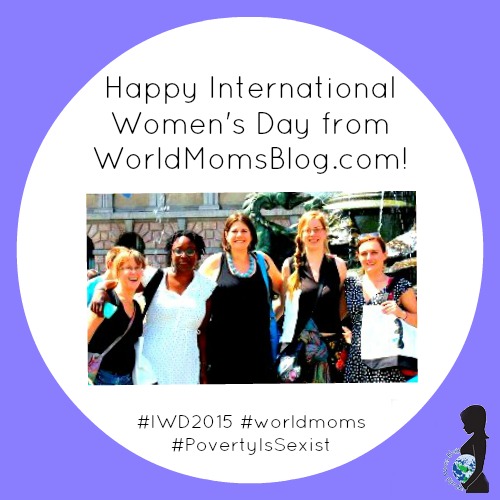
Today is International Women’s Day, also known as Working Women’s Day. To honour women, we, at World Moms Blog are looking at the challenges women face around the world and want to spark a discussion what it means to be a woman in the 22nd century. We also want to use this post as a reminder of how far we’ve come in some places and how much work we still have to do in others.
We asked our fabulous contributors this question: “What are the challenges women face where you live?” and received some thought-provoking, interesting answers.
Maureen Hitipeuw (Indonesia): “Equality. In a country where patriarchy is the ‘norm’ women are still being treated as second class citizen at times and that our place is at home, raising kids, cooking. Slowly this starts to shift, and I am happy to see the changes, but I am also very concerned about the support single mothers get here. Single fathers are deemed as ‘strong hero’ while single mothers still bear the negative stigma. Happy International Women’s Day!”
Mirjam Rose (The Netherlands): “I think it is balancing kids and work in the Netherlands . Although many fathers are willing to participate in taking care of their children, the work culture makes it difficult. Most bosses still expect that men simply come to work while their wives take care of the children. And because childcare has become increasingly difficult and expensive, more women are quitting their jobs or are working part-time, making it hard to pursue any career. At the same time the government expects women to work more.”
Kirsten Doyle (Canada): “In Canada, there is still wage inequality between men and women, and women are very poorly represented in the political arena. Another big challenge that isn’t spoken of often enough is how victims of rape are treated. We live in a blame-the-victim society that is hard to fight.”
Carol (Canada): “Another Canadian problem is our missing Aboriginal women. There is a lot of institutionalized racism in Canada regarding our native peoples, and we currently have an epidemic of native girls and women who have been murdered or have gone missing, without the police/authorities exerting much effort to find them or their killers. In the most worrying example, a serial killer managed to get away with killing probably 50 women over a decade period, and the police ignored it because the women he killed were all aboriginal or transient. But because several of the witnesses were also transient/aboriginal women, including the woman who claimed to be attacked, they weren’t taken seriously.”
Aisha Yesefu (Nigeria): “From birth the woman in my country faces discrimination. Some men have beaten their wives for giving birth to girls. Others have simply abandoned their wives at hospital for giving birth to girls. Sometimes there are tears because IT’S A GIRL. In terms of education the woman is given less chance to be in school. Discriminated upon even in her home. She has to do the whole house work while her male counterpart has time to read.
Women are not allowed to do certain jobs in my country. In some parts of my country women cannot own landed properties. They cannot inherit properties even from their husband. Women in some parts, too, are forced to go through dehumanising situations when their husband’s die like drinking the water used to wash the corpse to prove they have no hand in the death of husband.”
Nicole Morgan (USA): “The glass ceiling is not invisible. Dads being applauded for parenting, ummm Hello. Watching your children is NOT babysitting. Women fielding a myriad of responsibilities remains the usual, men stepping up to responsibility is not outside of the box, but part of being a dad!”
Olga Mecking (The Netherlands): “The Netherlands is a great place for women. The fathers are very involved, the support network is huge (daycares, for example) however even then there are challenges. For example, I believe there should be a bigger spectrum of birthing choices (not restricted to natural childbirth or homebirth). While it may seem that Dutch women found their work/life balance, the truth is that they are encouraged to work part-time- not too much, not too little. Again, this may be great for some, it is not enough for others. Also, Dutch women are still expected to do the majority of household and parenting chores. And, with government cutting down on daycare allowances, more and more women decide to stay at home rather than work.”

Jennifer Burden (USA): “Equal pay is still a huge issue that affects women in my country — studies indicate that women are paid less for the same jobs as their male colleagues. Also, our maternity leave is comparatively small — 12 weeks, and it is not necessarily paid, depending on the employer. I’d like to see these changes when it comes to my daughters’ future! I also want to add healthcare — there are still women who are uninsured or underinsured in the country. And more support for programs for moms who are living below the poverty line.”
Karyn (New Zealand): “For us there is a difference between those in poverty who have a whole raft of challenges to meet, just in order to get enough food and decent housing for their children, around 25% of all New Zealand children live below the poverty line. For those who have access to more money, it’s the pressure to be everything to everyone. Especially with us lot who had our children late and are often dealing with teenagers and aging parents at a time when our careers may be also at their peak.”
Elizabeth Atalay (USA): “In the U.S., we have wage disparity, some of the lowest numbers of women in government leadership positions in the world, and major childcare issues for working mothers.”
Sarah Hughes (USA): “To play off what Elizabeth just said, I think one of the biggest challenges in the US is being a working mother. Finding reliable, safe, engaging and good childcare is so hard. We pay in childcare more than most people pay in rent/mortgage per month. I have no idea how the average family can afford it. It’s a huge financial stress on our family which then turns into emotional stress, too!”
Adwoa Gyimah (Ghana): “Access to proper healthcare for the needy is a challenge in Ghana. There are systems in place to ensure that most, if not all, pregnant women get free healthcare access, but there are lapses that makes it challenging in some parts of the country, especially in the rural areas and even some urban areas. The country has come a long way in ensuring that all children of school going age can have free basic education, but there are still children on the streets selling or helping on family farmlands to earn some income to support their families.”
Nicole Melancon (USA): “I would say more opportunities for women who want to have a career and raise a family. I feel like it is all or nothing in our country.”
Also, one of our partners, the ONE Campaign, released a new campaign called “Poverty is Sexist” today! If you do one thing today, check out ONE’s new #PovertyIsSexist campaign: .
What about you, dear readers? What challenges do women face in you part of the world? Please tell us in the comments!
This is a collaborative post organized by World Mom contributor, Olga Mecking, The European Mama. Thank you, Olga!
Image credits to World Moms Blog and The European Mama.
World Moms Blog is an award winning website which writes from over 30 countries on the topics of motherhood, culture, human rights and social good. Over 70 international contributors share their stories from around the globe, bonded by the common thread of motherhood and wanting a better world for their children.
World Moms Blog was listed by Forbes Woman as one of the "Best 100 Websites for Women 2012 & 2013" and also called a "must read" by the NY Times Motherlode in 2013. Our Senior Editor in India, Purnima Ramakrishnan, was awarded the BlogHer International Activist Award in 2013.
More Posts

by Jacqueline Jenkins (Jordan) | Jan 28, 2015 | Blogging, Cultural Differences, Culture, Expat Life, Family Travel, Husband, Interviews, Moving, Working Mother, World Interviews
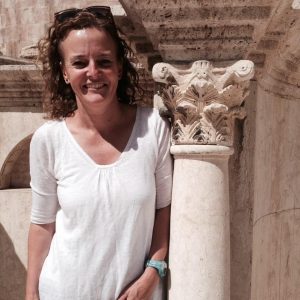 Where in the world do you live? And, are you from there?
Where in the world do you live? And, are you from there?
Four months ago, we moved to Amman, Jordan. Originally from Canada, I have been moving around the globe for more than twenty years as my husband works for UNICEF.
What language(s) do you speak?
I speak English and French. Learning Arabic is a big goal for our time here.
When did you first become a mother?
We were a carefree couple in Uganda, Lesotho, and Bangladesh. In 2000, while living in Myanmar, Meghan joined our family. In 2005, while we were posted in India, Charlie arrived. Since then, we have lived in Mozambique and New York.
Is your work stay-at-home mom, other work at home, or do you work outside the home?
I am an educator and have been incredibly fortunate to have found rewarding jobs in international schools wherever we have been posted. Most recently, I was the Elementary School Principal at the United Nations International School in Manhattan.
Since arriving in Jordan, I have been a stay-at-home Mum. I’ve been busy exploring, photographing and learning about the incredible history of the region and the issues facing not only the Jordan population, but the incredible number of Syrian refugees currently residing in the country.
My commitment to raising children who believe in peace and feel responsible for creating a better world is at the core of everything I do.
Why do you blog/write?
I write to record and process this incredible journey we are on as a family. Time passes so incredibly quickly. Without recording it, it’s hard to remember the small moments and wonderings from each posting.
How would you say that you are different from other mothers?
Being a mother in this transient lifestyle means being the key cheerleader for our family. It means setting up and taking down a house with six weeks’ notice. It means creating close friendships, and then saying goodbye. All this, while telling myself that giving my children this incredible opportunity makes the goodbyes and new hellos worthwhile.
What do you view as the challenges of raising a child in today’s world?
Raising a child in this lifestyle has incredible challenges and rewards. The challenges include culture shock every single time–even when I think the move will be easy. It means coaching myself, in my dark moments, to be present and supportive to my children. I remind myself that they have not chosen to move, but are trusting me to show them the meaningfulness of the lifestyle we have committed to as a UNICEF family.
The upsides to this lifestyle are incredible: our children interact and learn about cultures, languages, food, and religions firsthand; they are developing tolerance and empathy through relationships with many types of different people and the travel; and, before age ten, they have seen more of the world than some people manage in a lifetime!
How did you find World Moms Blog?
I learned about World Moms Blog when I was searching for women leading similar lives, facing similar issues, and who possessed the same strong desire to create a better world for our children and our children’s children. I feel blessed to be a part of this incredible community.
[Editor’s Note: A warm welcome, Jackie! We look forward to reading your posts as you settle in to your new role!]
Photo credit: Jacqueline Jenkins
This is an exclusive, World Moms Blog interview with our new writer and mother of two in Jordan, Jacqueline Jenkins. Welcome!

We are a few months into our new 'home of our heart' location in Amman, Jordan. Originally from Canada, I have been moving around the globe for more than twenty years as my husband works for UNICEF. While we were a carefree couple in Uganda, Lesotho and Bangladesh, Meghan joined our family in 2000, while we were living in Myanmar. She was joined in 2005, while we were posted in India by Charlie, her energetic younger brother! Since then we have lived in Mozambique and New York. I am an educator and have been incredibly fortunate to have found rewarding jobs in international schools wherever we have been posted. Most recently I was the Elementary School Principal at the United Nations International School in Manhattan. Since arriving in Jordan, I have been a stay at home Mum, exploring, photographing and learning about the incredible history of the region and the issues facing not only the Jordan population but the incredible number of Syrian refugees currently residing in the country. While I speak English and French, I have not yet started to learn Arabic; a big goal for our time here.
I write to record and process this incredible journey we are on as a family. Time passes so incredibly quickly and without a recording of events, it's hard to remember the small moments and wonderings from each posting. Being a mother in this transient lifestyle means being the key cheerleader for our family, it means setting up and taking down a house with six weeks notice, it means creating close friendships and then saying goodbye. All this, while telling yourself that the opportunities your children have make the goodbyes and new hellos worthwhile. Raising a child in this lifestyle has incredible challenges and rewards. The challenges include culture shock every single time, even when you feel the move will be an easy one. It means coaching yourself, in your dark moments to be present and supportive to your children, who have not chosen to move but are trusting you to show them the world and the meaningfulness of the lifestyle we have committed to as a UNICEF family. The upsides to this lifestyle are incredible; the ability to have our children interact and learn about cultures, languages, food, and religions firsthand, the development of tolerance and empathy through relationships with many types of different people and the travel, they have been to more places before the age of ten than some people do in a lifetime! My commitment to raising children who believe in peace and feel responsible for making a difference in creating a better world is at the core of everything I do.
More Posts
Follow Me:


by Jennifer Burden | Dec 11, 2014 | 2014, Global Citizenship, World Interviews
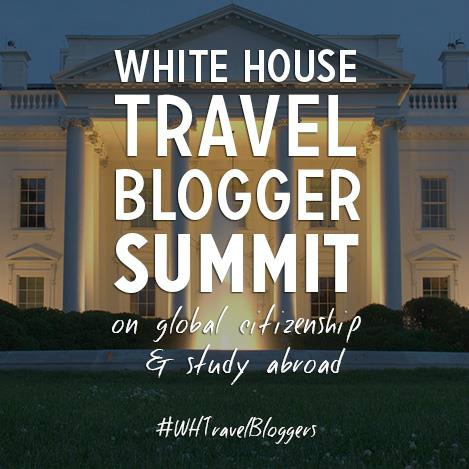
What I learned at the White House Travel Blogger Summit this week…!
On Tuesday, December 9, 2014, the White House invited over 100 social media influencers in travel and global citizenship to Washington, D.C. to discuss study abroad programs for students. Puzzled about the high level concern? Statistics show that our country is lacking in global ambassadors abroad, and this effects our global economic competitiveness and matters of global security.
Did you know that from 2012-2013 just under 300,000 U.S. students studied abroad for university credit?
It sounds like a big number, right? Well, according to Evan Ryan, Assistant Secretary of State for Educational and Cultural Affairs at the US Department of State, that number accounts for just 1.5% of the population of 20 million students enrolled during that same time period. Just 1.5%. Shocking, right? Yet, nearly 50% of students indicate that they are interested in studying abroad when they first enter university. So, why is traveling abroad as a student actually a rarity?
Some barriers to taking the international leap can be finances (that was my case!), no flexibility to take courses outside the university in your major, parental concerns, roommate concerns, intimidation of living in a foreign country and lack of information about programs and scholarships.
These were the type of issues that we discussed with top U.S. government officials at the White House Travel Blogger Summit this week. In fact, the White House has announced the launch of a U.S. study abroad office within the next 6 months, as well as, the first-ever Virtual Study Abroad Fair, to be held on February 25, 2015. The new office will help make it easier for more students, regardless of sex, race or socioeconomic status to make studying abroad a reality. And perhaps, we, at World Moms Blog can help with the parental concern part. 😉 (Stay tuned to the blog for advice for parents!)
Why is the U.S. State Department pushing the value of an international component of education?
Our next generation of leaders must have experience as global citizens to be able to “operate within the global political and economic landscape of the 21st century”, according to Evans. An increase of Americans traveling, studying, working and volunteering abroad also helps to break false American stereotypes.
Making Study Abroad Affordable…
Affording to study abroad is not a reality for many American students, which limits the pool of our student ambassadors, limiting the world’s picture of who the American student is. The diversity of American students has not been properly represented to the world with 76% of study abroad students in the 2012-2013 academic year being white, 5% African American, 8% Hispanic, 7% Asian/Pacific Islander, and less than 1% Native American, as per Ryan.
In my own student experience, I spent a summer abroad in Japan in high school thanks to a local scholarship, when I got to college the door to study abroad was closed to me. I was receiving need-based financial aid at a private university consisting of both, Federal aid and aid from my university’s scholarship fund. However the private funds only applied to my education at the university, not abroad. So, I was disappointingly priced out.
This week I had the opportunity to speak with Evan Ryan one-on-one just before she spoke at the White House Travel Bloggers conference, and when I told her my story, she told me about the Benjamin A. Gilman International Scholarship Program. This scholarship aims to target the population of U.S. students underrepresented in study abroad programs and sends about 2,000 kids abroad to study annually. To be considered for the scholarship, a U.S. student must be receiving need-based financial aid, such as an US Pell Grant or US Stafford Loan (two types of government subsidized need-based university financial aid).
The challenge? Over 9,000 students apply for the Gilman scholarship each year, but only 2,000 can go. It would be great for more students on need-based financial aid to have a global education experience, and the launch of the new U.S. office of study abroad plans to work toward just that goal — that study abroad is for everyone.
The Economic and Political Landscape is Changing and Friendship Aids Navigation
With greater access to transportation and technology in this day and age, the economic and political landscape is changing. There will continue to be more business and government roles that will require candidates who have foreign language skills and global experience. And, perhaps, the most important and overlooked landscape? Friendship.
Having friends around the world is interesting, fun and mind opening, as we have been learning for the past 4 years, here, at World Moms Blog. Being able to put ourselves in our foreign neighbors’ shoes to better understand what their lives are like makes us more understanding global citizens, and vice versa.
One of my most interesting moments in blog friendship was when one of our international contributors that I’ve been working with here over the years once said to me, “I had no idea Americans could be as understanding as you.” It took me by surprise! But then I realized where her statement was coming from — she was getting to know my country in a more personal way through our friendship, just as I was getting to know hers. Social interaction is key to global citizenship and breaking stereotypes.
Just by increasing the human interaction between people of different countries and cultures, I really believe that her sentence can be replaced with any nationality. The key is getting to know each other and realizing that what it is to be a good human prevails behind borders, burkas, playing helmets, Mardi Gras masks, kilts, saris, newspaper headlines and beyond. We just have to get to know one another, human to human, and then we can better navigate the changing global landscapes…together.
Want to know more about the White House Travel Blogger Summit? Watch the video here:
“When we study together and we learn together; we work together and we prosper together.” — President Barack Obama May 3, 2013 **Stay tuned for more about the White House Travel Bloggers Summit on World Moms Blog — we have even more to say about our tour of the White House, experience at the National Press Corp., Newseum tour and dinner sponsored by Turkish Airlines and additional speakers on global citizenship and travel abroad!
This is an original post by founder, Jennifer Burden of New Jersey, USA, to World Moms Blog.

Jennifer Burden is the Founder and CEO of World Moms Network, an award winning website on global motherhood, culture, human rights and social good. World Moms Network writes from over 30 countries, has over 70 contributors and was listed by Forbes as one of the “Best 100 Websites for Women”, named a “must read” by The New York Times, and was recommended by The Times of India.
She was also invited to Uganda to view UNICEF’s family health programs with Shot@Life and was previously named a “Global Influencer Fellow” and “Social Media Fellow” by the UN Foundation. Jennifer was invited to the White House twice, including as a nominated "Changemaker" for the State of the World Women Summit. She also participated in the One Campaign’s first AYA Summit on the topic of women and girl empowerment and organized and spoke on an international panel at the World Bank in Washington, DC on the importance of a universal education for all girls. Her writing has been featured by Baby Center, Huffington Post, ONE.org, the UN Foundation’s Shot@Life, and The Gates Foundation’s “Impatient Optimists.” She is currently a candidate in Columbia University's School of International and Public Affairs in the Executive Masters of Public Affairs program, where she hopes to further her study of global policies affecting women and girls.
Jennifer can be found on Twitter @JenniferBurden.
More Posts - Website
Follow Me:
























